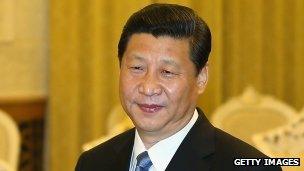China media: Russia visit
- Published

Xi Jinping is seeking to boost ties with Russia
As Xi Jinping heads to Russia, media in China feel Beijing and Moscow's strategic partnership will benefit the world and not target the US or the West.
Mr Xi arrives in Moscow on Friday on his first state visit before heading to Tanzania next week. Mr Xi will also attend the fifth Brics summit in South Africa, then head to the Republic of Congo.
China Daily, external says Mr Xi's visit will "turn a new chapter" in China's interaction with the rest of the world amid "concerns and even suspicions" that China may pose a threat to others or "seek hegemony".
A bilingual Global Times, external editorial says that if the US continues to see China and Russia through a "Cold-War lens" and tries to "contain" the two countries, Sino-Russian relations will be "more reactive".
Wan Chengcai, a research fellow at the Centre for World Affairs Studies of Xinhua News Agency, tells Global Times, external that China and Russia want a negotiated settlement to the Syrian crisis to stop "external powers" enforcing regime change and repeating the "tragedy of Libya".
Despite progress in China-Russia ties in recent years, The Beijing News, external hopes that China can boost its trade volume with Russia, which accounts for "less than 0.5%" of total global trade, lagging far behind Sino-US trade.
Zhu Feng, professor at the School of International Studies of Peking University, tells Global Times, external China and Russia are "chiefly fixated on the US, not on each other" in diplomacy.
Mr Xi's visit is an attempt to "restart" relations that have made little progress in the last decade, Prof Zhu says.
China must do more to "ease Russia's fears" over its rapid growth and influx of migrants in the Far East region, Jiang Yi, deputy director of Russian studies at the Chinese Academy of Social Sciences, adds.
Earlier this week, hundreds of Chinese internet users flooded the official microblogs, external of Russia's embassy with angry posts, Hong Kong's South China Morning Post, external notes.
"We want our land back, take away your Marxism-Leninism ideology," the Post quoted some internet users as saying.
A similar flood of hostile posts greeted the Russian embassy on its weibo launch in 2011.
'Good-hearted' first lady
Another key highlight of Mr Xi's overseas tour is his wife, Peng Liyuan, a famous military singer, will make a rare public appearance on the trip.
While the wives of former presidents Jiang Zemin and Hu Jintao and other top leaders have also appeared in the media on overseas tours, the buzz surrounding Ms Peng is unprecedented.
"A multitalented and good-hearted First Lady can certainly score points for the country. America has Michelle, while we have Peng Liyuan," Xinhua, external news agency says.
Music professionals tell Hong Kong's South China Morning Post, external that China's new first lady performed Chinese opera at the Kremlin in 2007 and is "too talented" to shun the stage during her husband's presidency.
In other international news, the Chinese defence ministry told China Daily, external that Beijing "firmly opposes" any moves that escalate regional tensions in response to Japanese media, external reports of a US-Japan "common defence plan" for the entire East China Sea, including disputed islands.
"China is extremely concerned by these reports... The Chinese government has the determination and ability to maintain the nation's territorial sovereignty," a Chinese Foreign Ministry spokesman said on Thursday.
Japan expert and former state councillor Tang Jiaxuan also repeated Beijing's insistence that Tokyo recognise the existence of the islands dispute and start negotiations during talks with top Japanese business figures in Beijing on Thursday, China Daily added.
Turning to domestic news, more than 100 dead pigs have been dredged from the Xiangjiang River in Zhuzhou, Hunan province, since 14 March.
The tally of dead pigs pulled from Shanghai's Huangpu River over the past two weeks has topped 14,000, Global Times , externalreports.
The Beijing News, external says a stinking "mountain of rubbish", so huge that it is called a "landmark" by drivers, could be contaminating the capital's water supplies.
For over 20 years, rubbish has been dumped into a ravine near Hebei province's Juhe River, which supplies water to the capital, the newspaper says.
BBC Monitoring reports and analyses news from TV, radio, web and print media around the world. For more reports from BBC Monitoring, click here. You can follow BBC Monitoring on Twitter , externaland Facebook, external.